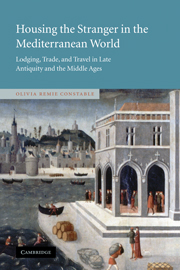 Housing the Stranger in the Mediterranean World
Housing the Stranger in the Mediterranean World Published online by Cambridge University Press: 27 August 2009
When the Iberian Jewish traveler Benjamin of Tudela arrived in Alexandria in 1165, he was struck by the busy commerce of the city, by the many foreign merchants doing business there – especially Latin Christians – and by the fact that each foreign “nation” possessed its own funduq. He described Alexandria as:
a commercial market for all nations. Merchants come thither from all the Christian kingdoms. On the one side, from the land of Venice and Lombardy, Tuscany, Apulia, Amalfi, Sicily, Calabria, Romagna, Khazaria, Patzinakia, Hungary, Bulgaria, Ragusa, Croatia, Slavonia, Russia, Germany, Saxony, Denmark, Kurland, Ireland, Norway, Frisia, Scotland, England, Wales, Flanders, Hainault, Normandy, France, Poitiers, Anjou, Burgundy, Maurrienne, Provence, Genoa, Pisa, Gascony, Aragón, and Navarre. And towards the west, under the sway of the Muslims: al-Andalus, Algarve, Africa, and the land of the Arabs. And on the other side India, Zawilah, Abyssinia, Libya, Yemen, Shinar, Syria; also Javan, whose people are called the Greeks, and the Turks … And the city is a busy one and full of traffic. Each nation has a funduq of its own.
Benjamin's comments have been criticized as exaggerated and unlikely, and it is indeed doubtful whether such a broad spectrum of foreign merchants were active in Alexandria in the second half of the twelfth century. Nevertheless, there is good contemporary documentation to support the core of his observations, that a number of western Christian merchant groups (as well as Muslim and Jewish traders) had colonies and enjoyed rights to funduqs in Alexandria in this period.
To save this book to your Kindle, first ensure no-reply@cambridge.org is added to your Approved Personal Document E-mail List under your Personal Document Settings on the Manage Your Content and Devices page of your Amazon account. Then enter the ‘name’ part of your Kindle email address below. Find out more about saving to your Kindle.
Note you can select to save to either the @free.kindle.com or @kindle.com variations. ‘@free.kindle.com’ emails are free but can only be saved to your device when it is connected to wi-fi. ‘@kindle.com’ emails can be delivered even when you are not connected to wi-fi, but note that service fees apply.
Find out more about the Kindle Personal Document Service.
To save content items to your account, please confirm that you agree to abide by our usage policies. If this is the first time you use this feature, you will be asked to authorise Cambridge Core to connect with your account. Find out more about saving content to Dropbox.
To save content items to your account, please confirm that you agree to abide by our usage policies. If this is the first time you use this feature, you will be asked to authorise Cambridge Core to connect with your account. Find out more about saving content to Google Drive.